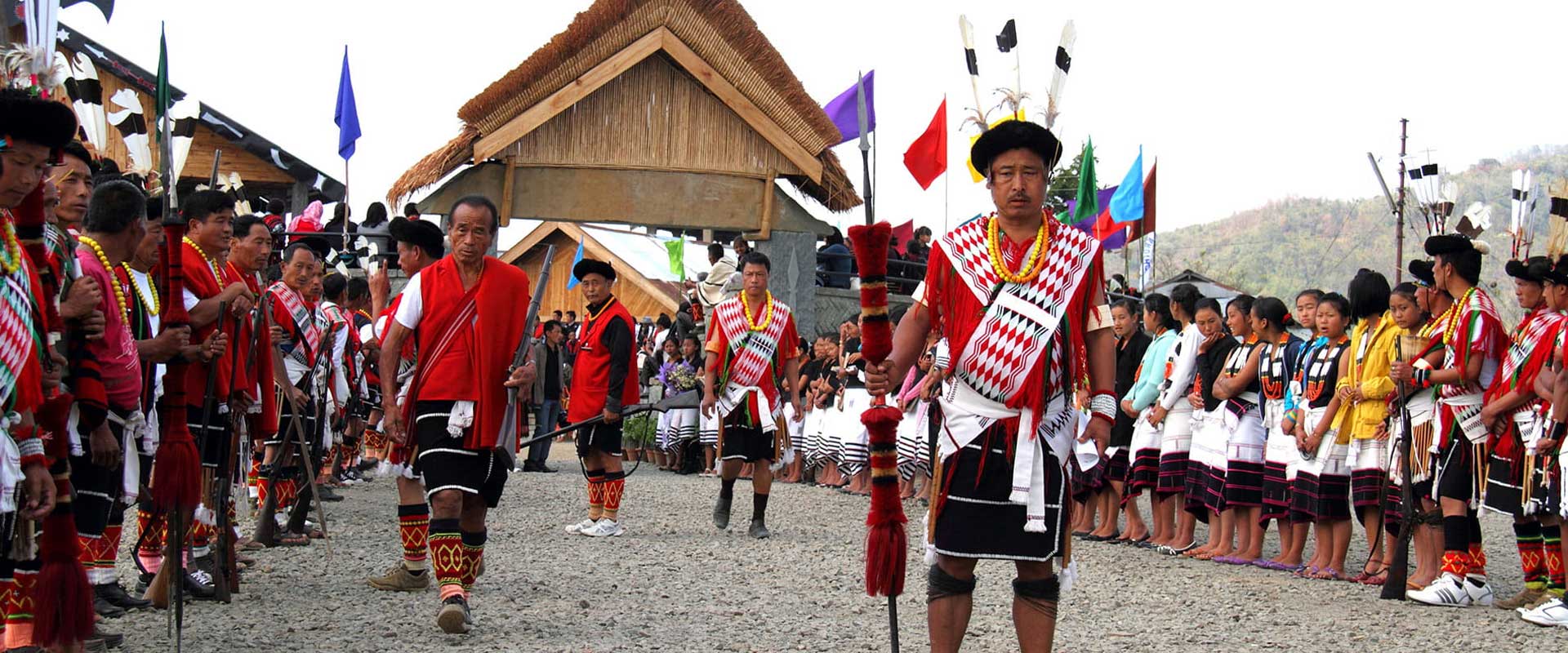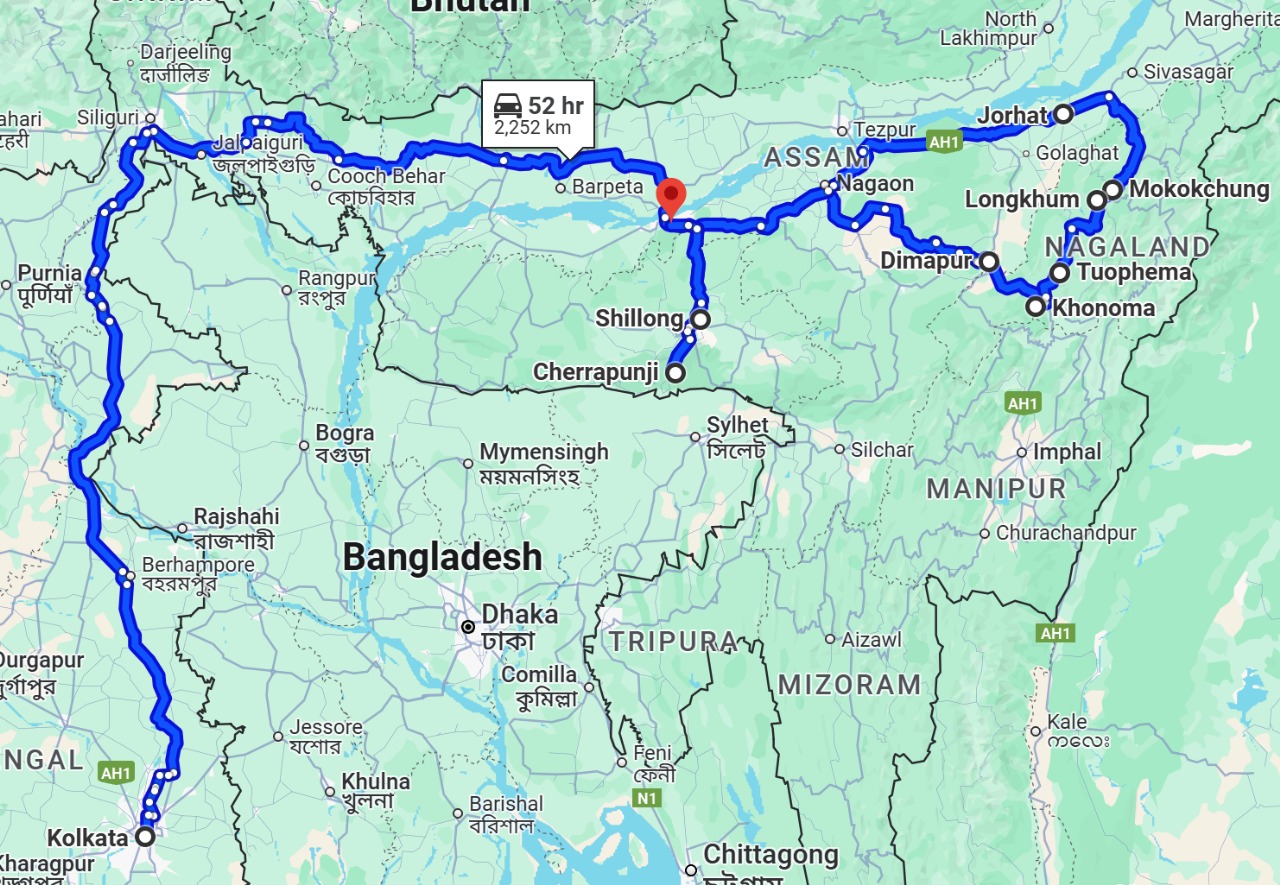- Home
- A&A Tours
- Trip Types
- Tailor Made
- Luxury Train Tour
- Destinations
- Luxury Hotels
- Luxury Cars
- About Us
- Find My Tour
To More Inquiry


Nagaland
is one of Northeast India's most fascinating states, and only recently has the
outside world been able to explore more of this land. A land of sixteen
indigenous tribes, Nagaland is commonly called as 'the land of festivals', as
the people here are always busy celebrating something or the other and have a
gala of a time. The topography of the region consists of remote mountains that
are a sub-part of the Himalayan Range. Due to decades of hostility until recent
years and under-development, the tourism infrastructure in the State is quite
basic, but this has only helped preserve Nagaland's pristine beauty. Though
Christianity is a major part of the tribal lifestyles, the tribes retain much
of their original and ancient customs and cultures which can be experienced
during village walks and also on the occasion of indigenous festivals. Most of
the rural folk were once fierce tribal warriors and headhunters, but are now
peaceful farmers and occasional enthusiast hunters, the tribes live sustainable
lives and utilize minimal resources. Villagers are friendly and welcome the
guests with great hospitality.
This
tour will take you across the hilly terrain of Nagaland from the Patkai hills
in the east to the base of Japfu Peak in the west. You will visit the verdant
hills of remote Mon district where the once headhunters Konyak Tribe live in
all their pride and fierceness. In Mon you will find many traditional elements
such as elderly tattooed warriors walking the streets and gathering at the
village chief's court to smoke opium. You will visit various villages where
people still dwell traditional long houses and get to learn more about Konyak
Naga culture. A visit to Lungwa is also included, a village which is half in
Burma and half in India. Moving along, you will visit the intellectual and
cultural capital of Nagaland – Mokokchung, where the fascinating Ao Tribe live
midst verdant hill You will get to see surrounding villages, old churches and
visit Ao traditional houses, Morung dormitories and log drums, thus learning
more about them. The tour will end in the Angami dominated regions of capital
Kohima and nearby villages such as Tuophema, Khonoma and Dzuleke where you will
be staying in homestays with local families, visiting villages and historic
remains of World War II.
With genuine interactions with the locals and the opportunity to observe both the traditional and contemporary aspects of Nagaland life, this trip offers the perfect introduction to the region.
Welcome
to the mesmerizing land of India. As per your scheduled flight, our
representative will assist and escort you by A/C Car and transfer to the hotel,
whilst the room key and check-in is organized. You will be briefed about the
tour and services. All documents will be handed over to you with traveling
brief and interaction for any query in terms of tour and services. Evening is
free for visiting local market and rest and relaxation. Overnight at the hotel.
Grown from mangrove swamps, Kolkata is the largest metropolis in India.
Kolkata's role in the national economy is of crucial importance as the Gateway
to Eastern India. Ships were the beginning of Calcutta's history & the
river Hoogly was the key to the city's fortunes. Vishnupur is famous for the
exquisite 17th & 18th century terracotta temples, Seat of classical music.
The Stylized, "Bankura horse" symbolic of excellence in rural
handicrafts is native to this district. Belur Math is a modern temple within
the grounds of the Ramakrishna Mission. Dakshineshwar Temple, dedicated to Kali
is built in the architectural style of Bengal. "
After
breakfast, depart the hotel and head to the airport to catch the scheduled
flight to Dimapur. Drive to Khonoma village once you arrive. The Western Angami
Tribes are the inhabitants of Khonoma. The evening is open for personal
activities and relaxation. Eat dinner and spend the night at a village house.
An
opportunity to observe indigenous farming practices following breakfast. The
town is well-known for keeping their Adler trees barren. Take a look at the
beautiful terraces made from the hillside. About 40 different types of paddy
are grown on these terraces at different elevations. The Khonoma Nature
Conservation and Trogopan Sanctuary (KNCTS) is located farther away. It is a
community-conserved area run by the Village Tourism Board as part of the
Khonoma green village concept. The goal of this initiative is to rescue the
state's endangered Blyth's Trogopan pheasant as well as numerous other native,
fragile, delicate, and unique plant and animal species. 'Kene' is a local game
that you can play in the afternoon. Come to a cultural event hosted by your
hosts. Stay in a local homestay for dinner and sleep.
Check out and have a walking tour of the village after breakfast. The best time to see every villager is in the morning. Following the village tour, travel to Jakhama Village. While there, stop by Kohima, the capital city, and check out the local market, which sells a range of food items and insects that the Nagas refer to as 'delicacies'. The renowned 'Tennis Court' conflict, which many historians have dubbed the 'deadliest battle', took place at the Second World War Cemetery and Memorial. The Japanese invasion of India was stopped here. Visit the state museum and the crafts emporium as well. Proceed to Touphema village after that. The community is heavily involved in the operation of this resort, which is a northern Angami tribal settlement. Modern restrooms will be provided in the Naga huts where you will reside. Eat dinner and spend the night at the nearby resort.
Walk to
the neighbouring Angami tribal settlement Gariphema after breakfast. The trek
is gentle, and it will take just 3.30 hours to get to the village. Look around
this village. Savour traditional folk dance and singing in the evening before
dinner. Spend the night at the resort in the village.
depart
early and travel to Longkhum, a village in the Mokokchung district (101 km; 2
hours) from Touphema. During the headhunting era, this village was a pioneering
Ao settlement. The Ao people believe that Longkum is where the deceased soul's
spirit rests before continuing on to paradise. Cherry trees line the approach
road to the village, making for a very lovely journey. Visit the Wokha market,
the Lotha people's house, and Lotha tribal communities while travelling. The
ideal elevation for Longkhum is 1846 meters. The snow mountains in far-off
Arunachal Pradesh can be seen on a clear day. The rhododendron blooms from
February to March. Locally produced handicrafts and handloom items are
available for purchase. At the village homestay, have dinner and sleep.
After breakfast, leave the guesthouse and go to Jorhat, stopping along the way to view Mockuckchung Bazar and Ungma village. Have a picnic in the Nagaland foothills close to the Assam border. Enter Assam and go to Jorhat, a major hub for the tea industry. These tea bungalows date back to the "Raj" era. You can recreate the era of the British tea planters by staying in one of these Heritage bungalows in a tea garden. Stay and eat at Bara Sahab's Bungalow on the outskirts of Jorhat town or at Thengal House. Overnight and dinner.
Today we
will go to Neemati Ghat, from where we will take a ferry across the Brahmaputra
to Majuli, one of the world's largest river islands and the centre of Assamese
culture. Our exploration of Majuli, the Assamese center of Vaishnava culture,
will take place here. It was here that the famous Assamese reformer and saint
Shankardeva established'satras', or Vaishnavite monasteries, to inspire the
populace to embrace culture and religion in the fifteenth century.
These'satras' are where we will be going to interact with the monks and other
places. See a Mishing tribal community in the afternoon. The Mishing people
moved all the way down from the Arunachal Pradesh hills. They are found on the
island's outer rim or close to rivers and other bodies of water in general.
Excellent fishermen—they are well-known for their proficiency in navigating the
Brahmaputra's ever-changing sand banks. Return to Jorhat in the afternoon. Eat
dinner and spend the night in the bamboo hut.
After
breakfast, proceed to Kaziranga National Park, a world heritage site that spans
858 square kilometres and is situated in the floodplains on both sides of the
Brahmaputra.
Two-thirds of the Great One-horned rhinoceros in the world are found in the park. Central (entry point at Kohora), Western (entry point at Bagori), Eastern (at Agratoli), Western-most Burha Pahar (at Ghorakati), and Northern are the five mountains that make up the park. The final is on the northern bank of the river, and the first four are on the southern side. In addition, it is home to one of the biggest herds of Asian elephants, the purest breed of Asiatic water buffalo, and nine of the fourteen primate species found in South India. You can tour the coffee, orchid, and tea gardens in the evening. Stay at Kaziranga and have dinner.
Kaziranga
National Park. Depending on availability, have an elephant ride at 5 AM.
Returning to the hotel for breakfast. After breakfast, travel to the Central
Range for a Jeep Safari. Spend the night in Kaziranga.
Make the transfer to Shillong after breakfast. Enjoy the 'Umiam Lake' next to Barapani after visiting the sacred sanctuary of Maa Kamakhya, a popular Hindu pilgrimage site. Upon arrival, check into the hotel. "Leishyllong" is the name of the city of Shillong, a Superpower or God thought to reside atop Shillong Peak, which overlooks the city. The State of Meghalaya's geographical region was once known as the "Scotland of the East" because of its remarkable resemblance to the Scottish Highlands. dinner and a place to stay the night.
After
breakfast drive to Cherrapunjee, (1300 m) and its surroundings areas are
blessed with many breathtaking views of nature in her pristine beauty with cool
springs, mind soothing waves of thick green jungle foliage, gurgling mountain
streams finding their way through rocks, enthralling milky white waterfalls
leaping into deep gorges in a thunderous applause to the record-breaking
rainfall that resounds through the valley. During the monsoon months it is a
thrill to catch sight of nature in the prime of her beauty when the clouds lift
their mantle over her for fleeting moments. Cherrapunjee has the distinction of
being the wettest place on Earth, having the highest recorded rainfall, year
after year. The Caves of Cherrapunjee- Mawsmai and Mawmluh, are the longest
limestone caves in India, formed over 3500 years, a must go destination for
cavers and adventurists. Other attractions - Cherrapunjee View Point,
Nohkalikai Falls, Seven Sister Falls and Eco Park Back to Shillong, Dinner and
overnight at Shillong.
After breakfast, depart and drive to Guwahati; upon arrival, check into the hotel; after refreshments, take a sightseeing tour of Guwahati, which includes the Kamakhya temple, the Umananda temple, and the astronomical temple of Navagraha; the evening is free to explore the local market; and spend the night in Guwahati.
Flying from Guwahati to Hometown After breakfast, check out of the hotel and head to the Guwahati airport to catch a scheduled aircraft to continue your journey. The trip ends with pleasant memories.


Immerse yourself in the grandeur of luxury at our exquisite palaces, hotels, resorts and safaris.
1 night, 2 adults
$ 4001 night, 2 adults
$ 3501 night, 2 adults
$ 3801 night, 2 adults
$ 4101 night, 2 adults
$ 3401 night, 2 adults
$ 3901 night, 2 adults
$ 8201 night, 2 adults
$ 655